Tinder Chinese Dating App
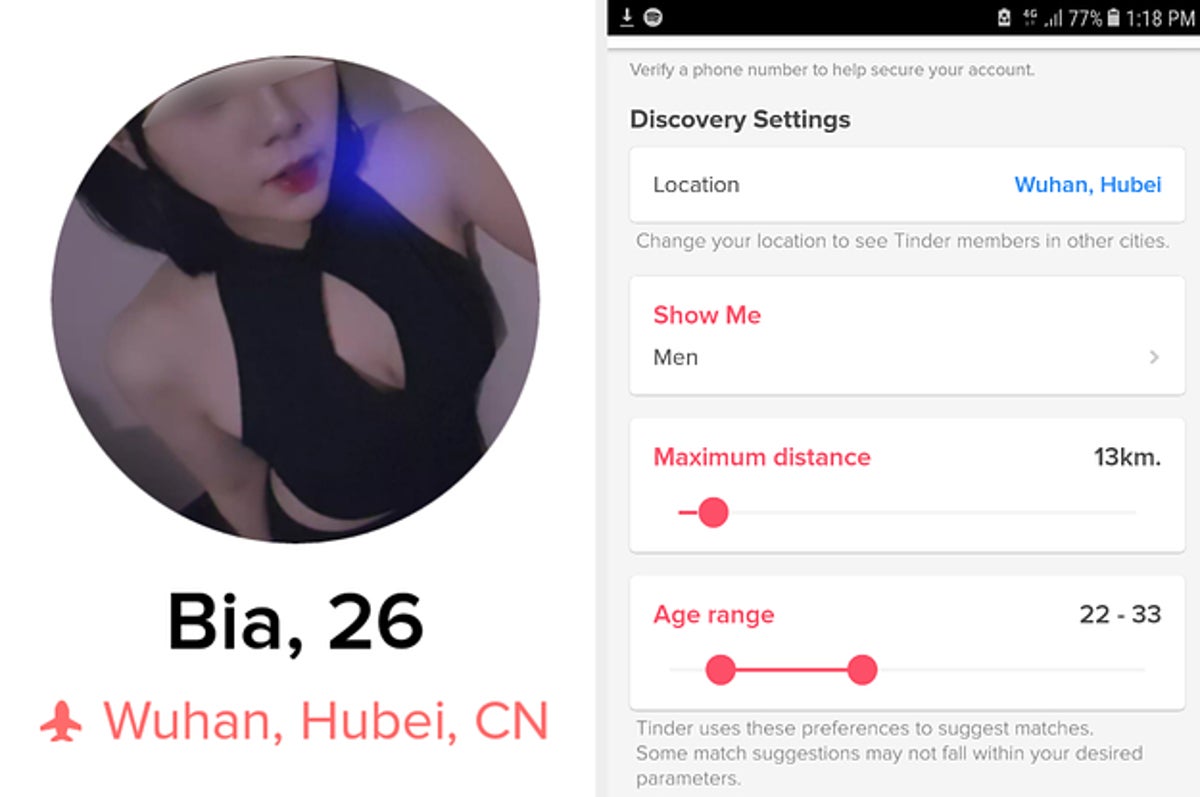
More expats in China are using dating apps to diversify their social circles and romantic options. Photo: IC
One of the best free dating apps in China, the Chinese app, commonly referred to as “Chinese Tinder,” is a popular dating app for foreign users in china. After registration, you upload photos to your profile and a short bio of necessary information such as your interests, likes, goals, etc. Of all the Chinese Dating Apps, the most popular one is Tantan. It’s often compared to Tinder for the way it works. It even looks like Tinder. Users can manually fill in their profile description and interests as there is no automated collection of user data the way Facebook works.
It was 11 pm on a Saturday night, and Jeff, a European expat who has been living in Beijing for five years, was just back from a party where he met a lot of new people, both foreigners and Chinese. Still, though, he felt just a little bit empty, a little bit restless, and so he logged onto Tantan, a Chinese dating app similar to Tinder, that he has been using for the past year.
He started swiping through prospective partners' pictures and limited profiles, which include information like age, zodiac sign and occupation. Swiping left means you do not like the person, right means you do. Left, left, and then, 'Oh, this girl is pretty. She's got a nice smile,' he said to himself, and swiped right. It was a match, which meant the girl also liked him. 'Hi, how are you?' he typed.
According to Jeff's profile on Tantan, 5,166 girls have liked him over the past year, which translates to 5,166 chances to meet new girls online. In that time, he's achieved 1,196 matches, which meant that he and 1,196 girls liked each other.
Chinese dating apps have been seeing growing popularity among expats living in China, in part because many foreigners' social circles are largely limited to other expats, and these apps give them the chance to meet and date locals. Among the most popular apps, both for Chinese and foreign singles, are Tantan, Momo and Skouts.
Sun Yang, a public relations director from Momo, told Metropolitan that they have seen more expats using their dating app over the past few years, though they didn't have any statistics detailing their number of foreign users.
Another dating app, Tantan, didn't reply to Metropolitan's calls as of press date, but according to Metropolitan's count, it contains around one expat user for every 10 Chinese users in expat-heavy neighborhoods like Guomao and Sanlitun.
Milo Gonzales, a Beijing-based relationship counselor from the US, said that dating apps are a quicker and easier way to meet new people for expats.
'It gives people the opportunity to talk and communicate to see if they have the same interests, and if their general viewpoints click before they meet in person to see if they are right for each other,' he said.
Women from the West and from China generally take different approaches to dating when using dating apps in China. Photo: IC
Some believe that relationships that start through dating apps tend to be more shallow since users are more focused on appearances. Photo: IC
The good and bad of cross-cultural dating
What Jeff likes about dating apps is how easy it is to find and meet pretty local girls. In real life, many expats work so much that they have only limited time to socialize, and when they do, according to Jeff, they mostly hang out with other expats.
'Dating apps help break that invisible boundary between expats and locals,' he said.
That has indeed been the case for the two male expats who talked to Metropolitan, both of whom have noticed they are more popular on Chinese dating apps than they are on apps in their home countries.
A case in point is Bruce from the UK, who has only been using Tantan for one month but has already received 236 matches.
'In the UK, when I use Tinder, I usually get 20 to 30 matches tops, because there are fewer girls who swipe right for me than in China.'
Another difference, according to Bruce, is that in the UK, it is usually guys who start the conversation and do the work to try and impress and win over the girls.
'In China, I feel the girls are more keen to meet with me and impress me. Chinese girls don't have arrogance is the best way to explain it, I guess.'
In his experience, Chinese girls on Tantan usually start conversations by asking where he comes from and what he does in Beijing, before asking for his WeChat, and then if he wants to meet up.
'But I think it's too quick,' Bruce said. So far, he has met two girls through Tantan.
Andrew, a Brit in Beijing who's been using Chinese dating apps for five months, says he quickly discovered that while women in the West generally start out chatting about shared interests, Chinese women are more likely to ask about his job and future plans.
He recalls one Chinese girl who, after a single date, began planning their wedding and future together in China.
'I understand that in China, some girls are facing pressure to get married before a certain age, which drives them to want to get serious faster in relationships,' said Andrew.
Another source of culture shock for expats is unrealistic expectations.
Shim Bo-kyung (pseudonym), a 24-year-old student from South Korea, said he often gets the impression that his Chinese dates like to imagine him as being just as rich and handsome as the characters from South Korean TV series.
'Some of my online dates would call me Oppa (Korean for 'older brother,' a term of endearment sometimes used for boyfriends) in a coquettish way just like in South Korean TV series, even though they are older than me, which just freaks me out,' he said.
'Some of them also assume that I am rich, even though I am just a student who works part time,' he said.
Shim added that some Chinese girls have even asked if he comes from a wealthy family like in the famous South Korean TV series The Heirs.
Flings vs serious relationships
Although dating apps have made it easier to meet more people, the relationships formed are often short-lived and shallow, because they were based in the first place on little more than appearances.
'With dating apps, people check out one another's pictures very quickly, and if they think you're attractive, that's it,' Jeff said. 'Most don't even look at the information you've written down.'
Gonzales said that, according to his observations, most guys who use dating apps are more interested in casual relationships, because so many apps are geared at hooking up.
Other expats have different intentions, and use dating apps more to meet locals, learn the language and deepen their understanding of China.
Bruce, for example, wanted to make new friends and maybe find someone who wanted to learn English and could teach him Chinese at the same time. As a result, he met a 19-year-old student who wants to study in the UK, and they've been meeting up to do a language and culture exchange.
Erika, a 22-year-old student from South Korea, has similar intentions to Bruce.
'I'm not looking for the love of my life on dating apps. I use them more for the sake of having different experiences and expanding my world view. By meeting more people from different backgrounds and careers, I've learned a lot about interacting with different kinds of people. I've learned how to start and carry a conversation, to alleviate awkward tension and to listen to others' stories,' Erika said.
She said the best experiences are when you hit it off with someone, and end up talking endlessly.
She recalls one guy she met, who works at an IT company, with whom she had a great conversation about philosophy and life. He also expressed interest in making Korean friends, since his work and social environment is exclusively Chinese.
'I've been surprised to see how eager most people are to interact with foreigners; it's just that they usually have few chances to do so,' Erika said. 'I think Chinese guys are more willing to start conversations with expat girls on apps than they are in real life.'
Newspaper headline: Swipe right for love
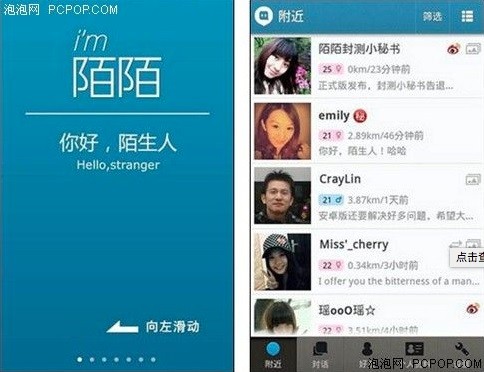
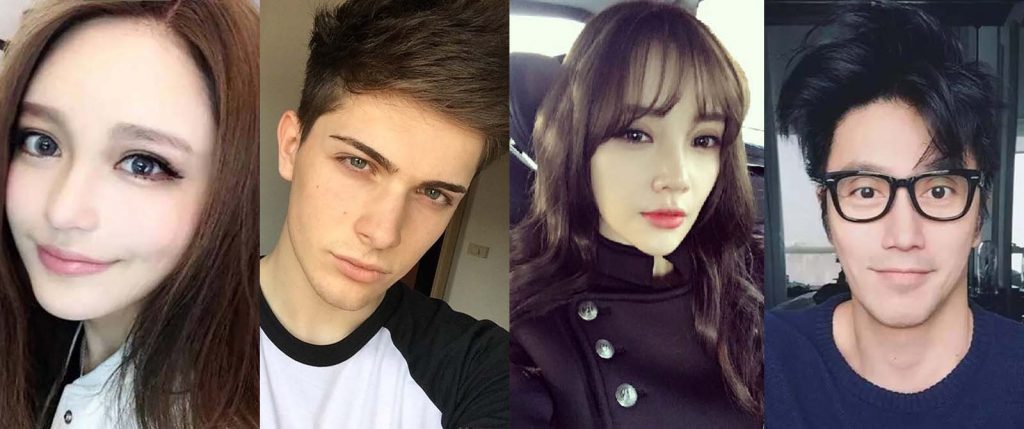
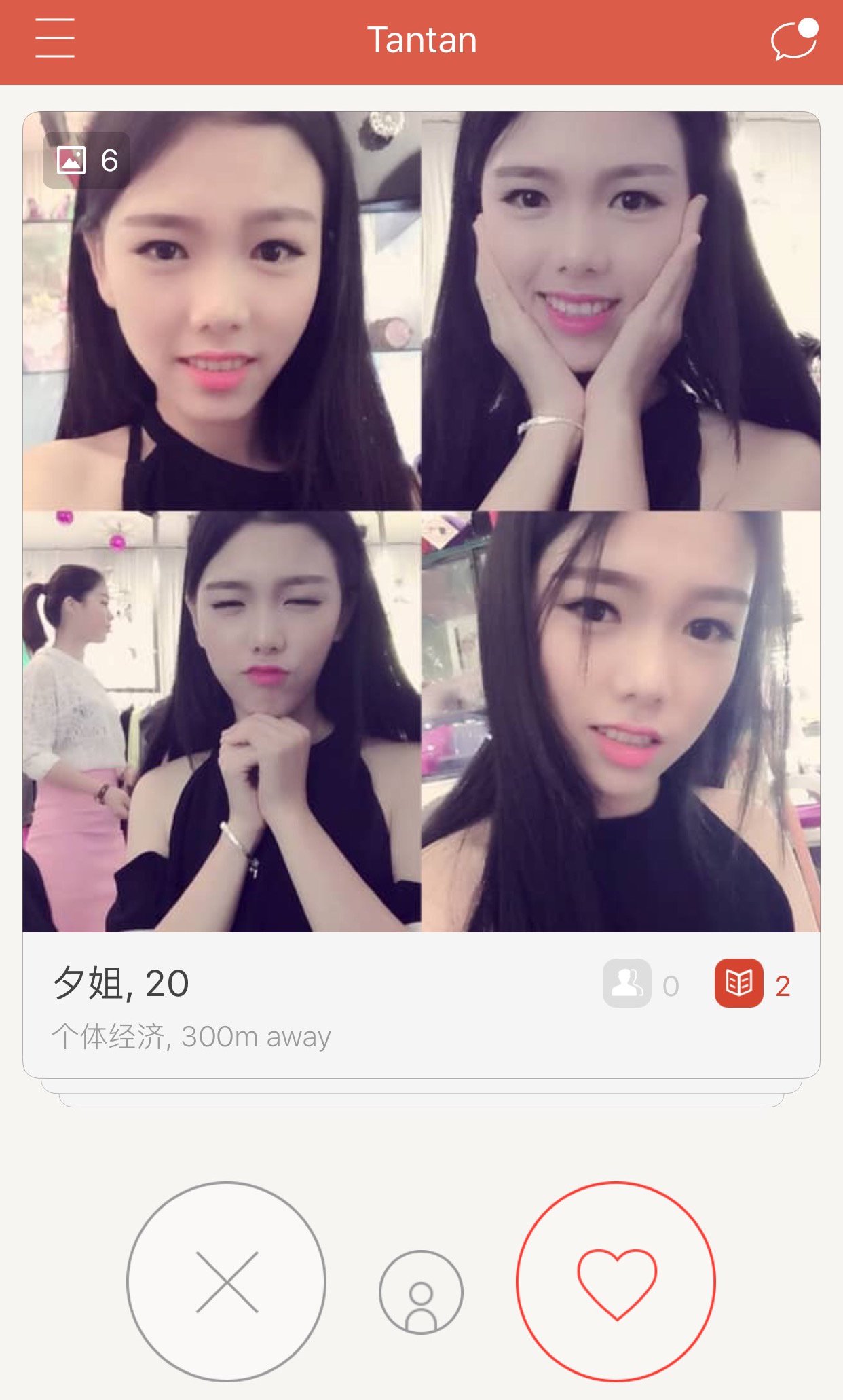
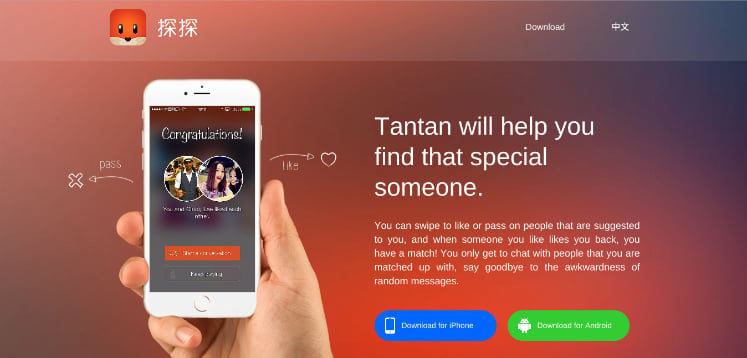
Tinder revolutionized the dating world when it was launched five years ago. The dating app’s unique design inspired a surge of location-based “swipe” apps which collectively morphed online dating from an odd, secretive habit into an acceptable way to meet partners. The algorithm-based sites of the early 2000s now look obsolete, and for millions, dating has been boiled down to one essential question: “Is this person hot?”
But, in drastically streamlining the attraction process, and entirely by accident, Tinder became the skeleton key to unlocking data on racism in America. The app’s data proves that black women and Asian men are the demographics on which the highest number of people swipe “left,” thereby rejecting them. By distilling dates down to a profile picture and a swipe, Tinder encourages users to act on their knee-jerk reactions, and that lightning fast process lights up corners of our minds we haven’t fully grappled with as a society. Black women and Asian men make up two demographics that have been long stigmatized as not-ideal sexual and romantic partners.
It’s not that Tinder made anyone racist. It’s that the app compiles data on the quick preferences, and prejudices, of millions around the world, exposing an uncomfortable and racist reality.
Established in 2004, a whole six years prior to Tinder, the dating site OKCupid ensured its longevity when it sought help from Tinder in 2013 to implement the swipe into its own platform. It was a year later when OKCupid founder Christian Rudder published Datacylsm, a book which collects illustrated data visualizations with stats from OKC user profiles. The book offers incredible insight into topics like our habits, our political beliefs, our speech patterns — and the assumptions many people still make about entire populations. Generally, most users on OKC — and by extension, other sites — “swipe left” on black women and Asian men the most. That data matches Tinder’s data exactly.
In a 2014 TIME article reporting on Datacylsm’s findings, Jack Linshi explained OKC’s 1 to 5 scale and how different racial groups of women rated Asian men. It wasn’t high.
“While Asian women are more likely to give Asian men higher ratings, women of other races—black, Latina, white—give Asian men a rating between 1 and 2 stars less than what they usually rate men,” wrote Linshi. “Black and Latin men faced ‘similar discrimination,’ while white men had ratings “most high among women of all races.”
Meanwhile, black women were considered the “least desirable” among all races of men. “Asian, Latin and white men tend to give black women 1 to 1.5 stars less, while black men’s ratings of black women are more consistent with their ratings of all races of women,” he wrote. The most highly-rated groups of women by men were those of Asian and Latin descent, with white women not far behind.
While people are free to have their individual preferences, it is extremely telling that two unique demographics are ostracized on several different dating platforms. Basic knowledge of human history, particularly American history, reveal where and how the alienation of black women and Asian men began. (It’s important to note that these subjects are dense enough to fill whole libraries, so further reading elsewhere is encouraged.)
European colonists who orchestrated the African slave trade created caricatures, such as the Jezebel and the Sapphire, in order to further dehumanize and stereotype black women. Because of their strength and enslavement, black slaves were paradoxically fetishized by white masters who were both abhorred and allured by black women and their sexuality. It should come as no surprise then that white slave owners took in black women as sexual slaves, raping black women as they married white women.
The modern incarnation for stereotyped black women is the plainly-named “angry black woman.” Stereotyped as hot-tempered, independent narcissists in our culture, and in our popular media, this image has been damaging to the cultural collective; in 2016, Anni Ferguson wrote in the Guardian how black females are statistically diagnosed with mental illnesses more than twice as often when compared to white women. “The fact that black women face struggles with perception every day can often mean that the constant fight seems normal,” writes Ferguson. “It became clear that these women were resigned to their fate. As a black woman you are scary, inadequate, ugly or hyper-sexualized – and you just have to accept it.”
Asian men have had a vastly different cultural experience in the Americas. Although not subject to the indignities of enslavement, Asian immigrants during 19th-century westward expansion formed the basis for today’s prejudices against a cheaper-to-hire foreign working class. America’s first Asians endured discrimination from whites who felt their jobs were stolen, so their effeminate clothes, alien languages, and smaller physical features became targets. Early American media birthed the Yellow Peril, a treacherous imp who sought white women and white lands.
Throughout the 20th century, after numerous discriminatory laws (such as Chinese Exclusion Act of 1882, the Immigration Act of 1917, the Geary Act, all anti-miscegenation, which included blacks and Native Americans) were repealed, America entered war with the Japanese, then later Communist-backed North Korea and North Vietnam, which created new stereotypes energized by the ghosts of old. When it was all over, Asian men found a new box to fill in: the model minority, over-worked math nerds who aren’t sexy enough to party with. And the model minority stereotype, as well, has left its share of psychological damage on Asian-American young people.
It’s important to note that Dataclysm focused on data uncovered by OKCupid, but it’s not unreasonable to think human beings seeking sexual and romantic partners won’t behave differently just because of the platform they’re using. A number of first-person accounts, including Michelle Ofiwe in Complex in 2016, Charlie Brinkhurst-Cuff in Vice in 2015, Serena Smith in Babe earlier this year, and Mahesh Sharma in Sydney Morning Herald in 2016, help illustrate that our sexual prejudices extend to Tinder, Bumble, Hinge, and beyond.
It was also in 2016 when comedians Jessica Williams and Ronny Chieng explored sexual racism in a segment for The Daily Show, which (humorously) found the same data across all dating apps. As Rudder himself put it during the segment: “Everybody, collectively, is rating Asian men and black women poorly.”
Tinder found a reason to reckon with its role in society earlier this summer. In a login video exclusive to Hong Kong users, Tinder showed a user swipe left only once on the only Asian male in the commercial. The site was slammed online. Though the company said in its apology that “it was not our intention” and that “we see in retrospect how the content could be seen as insensitive,” it provided proof that the struggles of dating as a member of a marginalized group are invisible to everyone else.
Tinder Chinese Dating App
Everyone has their individual preferences. Some women like people with blue eyes, some guys like girls with short hair. But some prefer people from a specific race. While the fetishizing and discrimination of entire races in the realm of dating is wrong, it’s also something an overwhelming amount of people are guilty of. Until we openly admit and own up to it, the data will speak for itself.